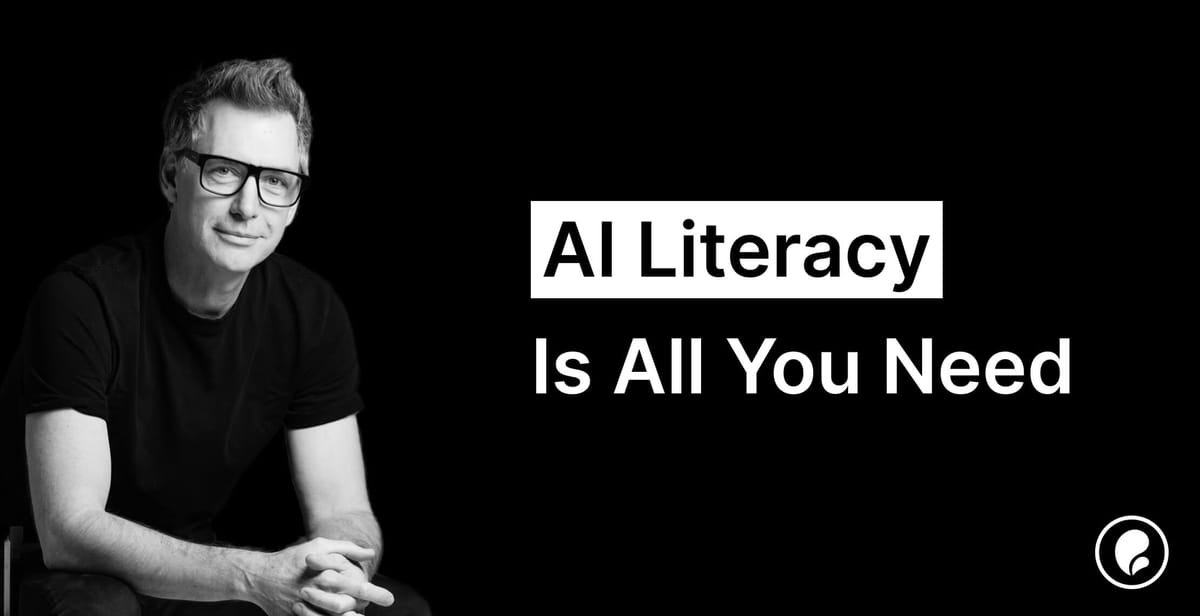
You'd be excused for thinking that AI excitement is at the top of the hype cycle, but there might be more frothiness to come. The business world is a little drunk on enthusiasm, and ignorance, over AI. The promised transformational gains in efficiency, creativity, and profitability are so close, but for many companies, the ROI on AI initiatives remains elusive.
Surprisingly, the barrier isn’t just technical complexity—it’s a gap in understanding what AI is and how it fits into the workflow.
In this article, we explore how AI literacy fuels ROI, why a more informed workforce is essential, and how businesses can future-proof their teams to thrive in an AI-driven landscape.
AI ROI Starts with a Literate Workforce
The return on AI investments is not automatic. As highlighted in Maginative’s recent podcasts and articles, AI’s potential lies in its strategic alignment with business goals—not just in its raw technological capabilities. As with all transformations, this alignment can only happen when leaders and employees alike understand what AI is, how it works, and how to wield it effectively.
The ROI Barrier: Knowledge Gaps
Consider a marketing team implementing AI for campaign personalization. Without understanding AI’s data dependencies or ethical considerations, the team might deploy models poorly trained on biased data, leading to subpar outcomes and brand reputation risks. AI literacy mitigates these risks by empowering employees to ask the right questions, evaluate AI outputs critically, and identify opportunities for refinement.
The Bottom Line: AI ROI depends on a workforce that sees AI not as a black box but as a collaborative partner. A literate workforce turns AI from a tool into a force multiplier.
Boosting Productivity and Creativity Through Education
Productivity Gains Through Applied Understanding
AI excels at automating repetitive tasks, freeing employees to focus on high-value work. However, these gains are squandered when teams lack the confidence to integrate AI into their workflows effectively.
For almost all employees it's time on task that builds the muscle of understanding and mastery. You can't truly understand what you don't have experience with. Because AI will replace most low-level tasks, junior employees that often rely on repetitive tasks to develop foundational skills won't get to put in the reps. AI automation risks bypassing these learning opportunities unless companies integrate mentorship programs alongside AI adoption. AI literacy ensures employees can pair AI-driven efficiency with strategic decision-making.
Creativity as a Competitive Advantage
The real promise of AI is its ability to augment human creativity. GenAI can assist designers in brainstorming new concepts, update components, build prototypes or enable product managers to simulate user flows. But without literacy, teams become over-reliant on AI outputs and ignore outcomes.
By understanding AI’s strengths and limitations, teams can use it as a springboard for ideas rather than a crutch, ensuring that human creativity remains at the heart of problem-solving.
AI Literacy Enables Scalable and Ethical Innovation
Scaling Impact
AI literacy bridges the gap between individual productivity and team-wide efficiency. When every employee—from engineers to executives—understands how to align AI tools with organizational objectives, companies can scale AI projects more effectively. For example, by fostering a shared language around AI, cross-functional teams can streamline collaboration, reducing time-to-market for new products.
Ensuring Ethical and Sustainable AI
An AI-literate workforce is also essential for mitigating risks, from algorithmic bias, and regulatory requirements, to data privacy concerns. Employees equipped with foundational knowledge can proactively identify and address these issues, ensuring that AI adoption aligns with ethical and regulatory standards.
Building an AI-Literate Organization
Leadership First
I've had hundreds of conversations this year with executives, and far too many of them are stuck in a "wait and see" mindset or feel AI is "too tactical" for their attention. Executives and managers must model AI literacy by investing in their own education. The more public this education the better. Programs that teach leaders how to contextualize their understanding, evaluate AI ROI, implement ethical frameworks, and drive organizational change can set the tone for company-wide adoption. Leadership focused events like the Leading In The Intelligence Age, hosted by Maginative, are a great way for leaders to learn from experts and their peers in a secure environment.

Role-Specific Up-skilling
Not every employee needs to know how to code an AI model, but every role can benefit from tailored education. The car metaphor is the best. Not everyone needs to know how the engine of a car works, but most of us benefit from knowing how to drive a car. The same is true for AI. We shouldn't expect everyone to be an AI engineer, but we should expect employees to be able to use AI tools to boost their creativity, increase productivity, and reduce the mundane work that can lead to burnout and boredom. Some examples might be:
- For Analysts: Training on data interpretation and AI integration.
- For Designers: Insights into AI-generated creativity.
- For Marketers: Understanding AI’s capabilities for personalization and segmentation.
Companies should create environments that foster continuous AI learning. Maginative’s workshops and Linkedin Learning programs, for example, provide accessible, role-relevant content to keep employees engaged and informed.
The ROI of an AI-Ready Culture
The ultimate ROI of AI literacy is resilience. Businesses that prioritize education will build adaptable teams capable of navigating the rapidly evolving AI landscape. These organizations will not only maximize the value of their current AI investments but also position themselves as leaders in innovation.
As Maginative’s frameworks demonstrate, AI is a team sport. Its true power emerges when humans and machines work together seamlessly. By investing in AI literacy today, companies can ensure their workforce remains not only productive but also creative, confident, and future-ready.
AI is reshaping the workplace, and with it, the definition of workforce readiness. Companies that embrace AI literacy as a core competency will unlock not just the ROI of their AI tools but also the full potential of their teams.
For businesses looking to start their journey, Maginative offers tailored AI literacy solutions designed to bridge the gap between understanding and action. Let’s build a workforce that doesn’t just survive the AI revolution but thrives in it.

